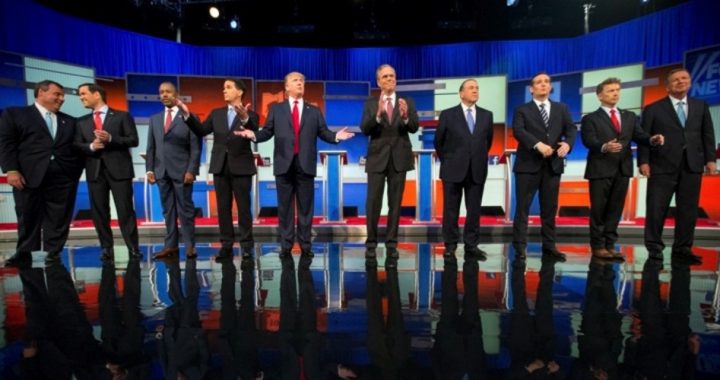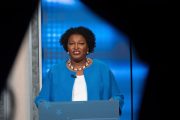
The first of 12 planned 2016 Republican presidential candidate “debates” — hosted by Fox News, Facebook, and the Ohio Republican Party — was held in Cleveland, Ohio, on August 6, providing the top-polling candidates with an opportunity to square off and make themselves and their positions known. Though the large number of candidates present and very limited time available for each one to speak did not provide a chance to establish a clear winner, pundits have expressed varying views about which candidates improved their standings in the race through shining performances and which candidates fell flat.
With 17 announced candidates for next year’s GOP presidential nomination, the debate was limited to the 10 highest-polling candidates, as measured by the average of the top five national polls selected by Fox. They included businessman Donald Trump, former Florida Governor Jeb Bush, Wisconsin Governor Scott Walker, former Arkansas Governor Mike Huckabee, neurosurgeon Dr. Ben Carson, Texas Senator Ted Cruz, Florida Senator Marco Rubio, Kentucky Senator Rand Paul, New Jersey Governor Chris Christie, and Ohio Governor John Kasich.
The candidate who has generated the most controversy, and perhaps the most talk of how well he did in the debate, was Donald Trump. Trump led a CBS News Poll conducted by telephone from July 29-August 2, 2015, receiving a 24-percent approval rating, followed by Jeb Bush (13 percent) and Scott Walker (10 percent). Right from the start, when Fox News moderator Bret Baier asked the candidates to raise their hands if they were “unwilling tonight to pledge your support to the eventual nominee of the Republican Party and pledge to not run an independent campaign against that person,” Trump was the only one who raised his hand.
When Baier made sure that Trump understood the question and asked: “You can’t say tonight that you can make that pledge?” Trump replied:
I cannot say. I have to respect the person that, if it’s not me, the person that wins. If I do win, and I’m leading by quite a bit, that’s what I want to do. I can totally make that pledge. If I’m the [Republican] nominee, I will pledge I will not run as an independent.
Rand Paul was the only candidate on the stage to take Trump to task for his lack of commitment to the unknown candidate who would probably face Hillary Clinton, shouting out: “This is what’s wrong!”
After Baier acknowledged him, Paul continued:
Hey, look, look! He’s already hedging his bet on the Clintons, OK? So if he doesn’t run as a Republican, maybe he supports Clinton, or maybe he runs as an independent…. but I’d say that he’s already hedging his bets because he’s used to buying politicians.
A selection of pundits asked to comment by CNN varied in their assessment of Trump’s performance, with the network’s senior political analyst, David Gergen, saying that the business magnate “hurt himself last night, especially with opening answers that came across as narcissistic and boorish.”
Another commentator polled by CNN, Dan Pfeiffer, a former senior adviser to President Obama, said:
This was the Donald’s debate. He dominated the discussion, he was the focus of the moderators, social media traffic spiked every time he opened his mouth. Other than Rand Paul (who is apparently still running for President), all of his fellow candidates went out of their way to avoid stoking his ire.
Despite all of the attention he has received, which this writer attributes more to his showmanship than to his statesmanship (which he apparently lacks), Trump simply did not appear to be the least bit presidential in his demeanor. Even though several recent presidents have lowered the bar, the American public still expects a modicum of dignity in our head of government and state, and Trump simply lacks that. Furthermore, his answers to serious question tended to be short on any factual information and big on generalities expressed in elementary school-level language. As one example:
Border Patrol, I was at the border last week. Border Patrol, people that I deal with, that I talk to, they say this is what’s happening. Because our leaders are stupid. Our politicians are stupid. And the Mexican government is much smarter, much sharper, much more cunning. And they send the bad ones over because they don’t want to pay for them. They don’t want to take care of them. Why should they when the stupid leaders of the United States will do it for them? And that’s what is happening whether you like it or not.
It is not so much that those who believe that our borders should be made more secure and that illegal immigrants should be kept out would disagree with him that our border security is greatly deficient, so much as Trump is averse to providing any real documentation, statistics, or other specific examples to bolster his arguments. Maybe viewers of TV reality shows are accustomed to such shallow expression, but those who remember the Nixon-Kennedy debates of 1960 or even the Reagan-Carter debates of 1980 expect more intelligent discussion.
One of the most interesting exchanges during the debate was between Paul and Christie over the issue of warrantless NSA programs that spied on tens of millions of innocent Americans by logging all phone calls they dialed and received. In response to a statement that Christie had made a while back that that if America is hit by another terrorist attack like that on 9/11, Paul should be called before Congress to answer for his efforts to constrain the NSA’s domestic spying.
“Do you really believe you can assign blame to Senator Paul just for opposing the bulk collection of people’s phone records in the event of a terrorist attack?” Fox News anchor Megyn Kelly asked Christie. Christie replied, in part:
Yes, I do. And I’ll tell you why: because I’m the only person on this stage who’s actually filed applications under the Patriot Act, who has gone before the federal — the Foreign Intelligence Service court, who has prosecuted and investigated and jailed terrorists in this country after September 11th.
I was appointed U.S. attorney by President Bush on September 10th, 2001, and the world changed enormously the next day, and that happened in my state….
And I will make no apologies, ever, for protecting the lives and the safety of the American people. We have to give more tools to our folks to be able to do that, not fewer, and then trust those people and oversee them to do it the right way. As president, that is exactly what I’ll do.
Before moving on Paul’s response, it should be noted that Christie’s claim to have been appointed U.S. attorney the day before the September 11, 2001 attacks was completely false, as was pointed out the next day by Alan Pyke, the deputy economic policy editor for ThinkProgress.org. Pyke noted:
Reports from the time suggest that Christie’s nomination to the vacant U.S. Attorney slot in New Jersey was widely anticipated prior to the attacks. But Bush didn’t actually nominate him until December 7 of that year, and he did not assume office until early 2002. The “Meet Chris” section on Christie’s campaign website says that he “served as U.S. Attorney from 2002-2008.”
This may seen like a minor point, except that Christie’s argument against Paul, instead of being based on any credible assessment of the value of the bulk collection of people’s phone records to preventing future terrorist attacks, was an emotional appeal based on the governor’s recollections of going to funerals of 9/11 victims and of losing friends at the World Trade Center. As tragic as those events were, they have little bearing on the discussion and cannot be used to justify violating Americans’ rights under the Fourth Amendment, as Paul pointed out:
I want to collect more records from terrorists, but less records from innocent Americans. The Fourth Amendment was what we fought the Revolution over! John Adams said it was the spark that led to our war for independence, and I’m proud of standing for the Bill of Rights, and I will continue to stand for the Bill of Rights.
Christie retorted by calling Paul’s answer “ridiculous” and the two sparred for a while, with Paul advising Christie to abide by the Fourth Amendment and get a warrant if he wants to obtain private information from Americans.
If the topic comes up in a future debate, and Paul and Christie are still hashing out the issue, it might serve Paul well to remind Christie of something Benjamin Franklin once said: “Those who would give up essential Liberty, to purchase a little temporary Safety, deserve neither Liberty nor Safety.”
Of the other candidates, Marco Rubio seemed to be having a good night, and consistently spoke with assurance and without hesitation. Tara Setmayer, a former communications director for Representative Dana Rohrabacher (R-Calif.) and a CNN political commentator, said of the Florida senator: “On a night filled with plenty of zingers and testy exchanges, Rubio was able to rise above the bickering and overly produced bravado. He was prepared, comfortable and most importantly, relatable.”
Scott Walker answered a tough question about the Wisconsin economy satisfactorily and received applause by referring to the current controversy regarding Hillary Clinton’s private e-mail setup, saying Russia and China “know more about Hillary Clinton’s email server than do the members of the United States Congress.” While not coming across as a dynamic figure, he nevertheless made a respectable showing.
Several pundits thought that Jeb Bush was having an off night, though he did appear to have something that Trump lacked, a dignified persona that could be described as “presidential.” Yet, he faltered when trying to answer questions about whether or not his brother’s decision to invade Iraq was a mistake, admitting that the former Bush administration had bad information.
Ben Carson’s lack of political experience was evident, though his sincerity and genuineness worked in his favor. He also scored points for calling for the strengthening of America’s military, noting that our Navy is at its smallest size since 1917 and our Air Force, since 1940.
Senator Ted Cruz came across well, and was strong on the topic of illegal immigration and expounded on his proposal to defeat ISIS. He received applause when he delivered what was perhaps his strongest line of the evening: “We need a president that shows the courage that Egypt’s President al-Sisi, a Muslim, [showed] when he called out the radical Islamic terrorists who are threatening the world.”
One of the candidates who perhaps benefited the most from the debate is Governor John Kasich, who is not well known outside Ohio. His participation gave him the opportunity to make himself known to the American public and he received enthusiastic reaction from the hometown crowd. Though there was nothing outstanding about his delivery, he made no mistakes, either.
Former governor Huckabee was polished, reflecting on his years of experience in public life, and he had an opportunity to reinforce his image as a defender of traditional morality, opposing same-sex marriage and abortion.
With each candidate being given only a few minutes’ time, it was impossible for the participants to delve into any one subject in significant detail, but it did provide at least a cursory look at where the contenders stand on the major issues. However, unless there are significant changes during future debates, it is doubtful if any meaningful voter education will result from these types of “debate” forums, where a showman such as Donald Trump receives more attention than other candidates who have more substantial material to offer.
Photo: AP Images



